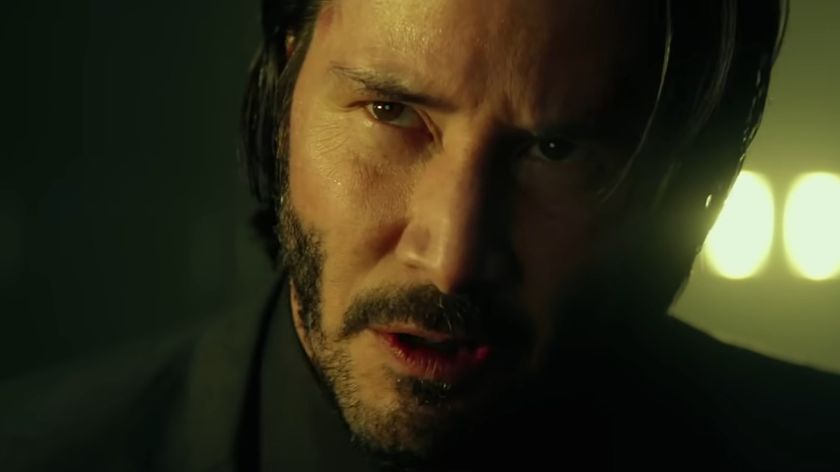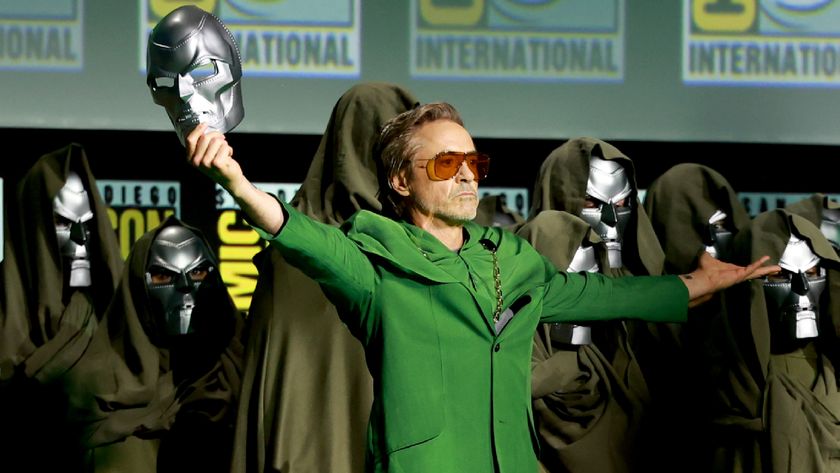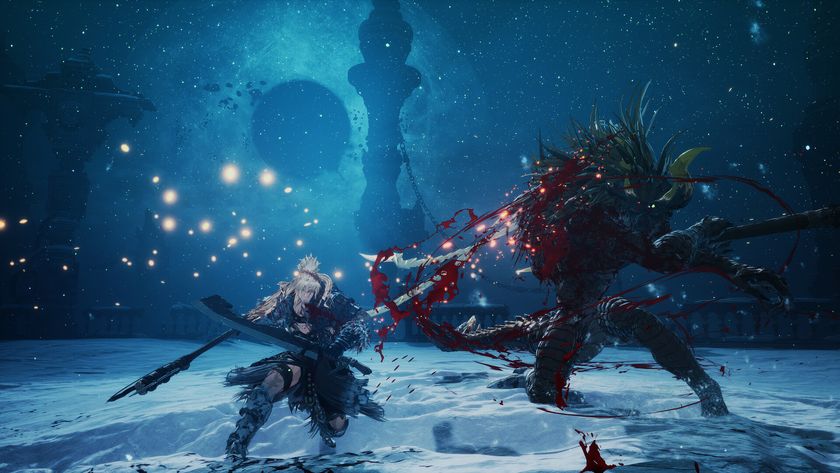Jake Gyllenhaal and the Road House cast talk unbelievable fights and reimagining a cult classic movie
Jake Gyllenhaal is the new bouncer in town as a UFC-flavored remake of '80s favorite Road House finally hits screens
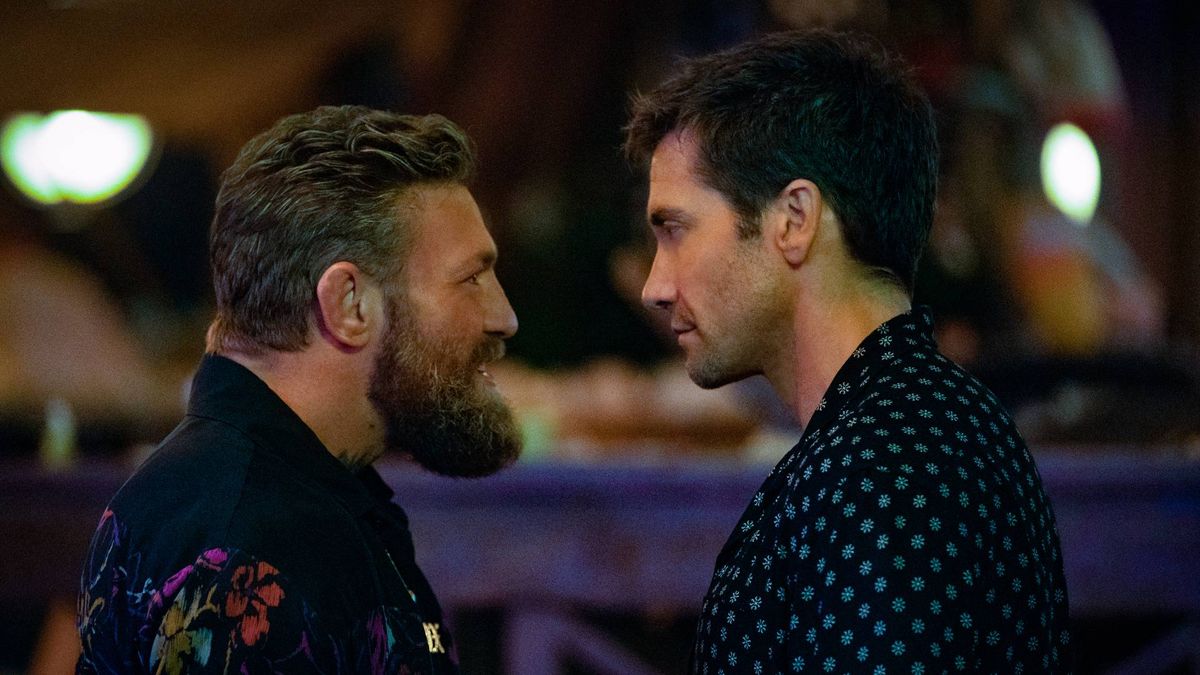
The name’s Dalton…’ Nothing epitomised Patrick Swayze’s screen cool quite like 1989’s Road House, an action film very much of its decade. Sandwiched between Dirty Dancing and Ghost on Swayze’s CV, it cast him as ‘cooler’ (read bouncer) Dalton, brought in to clean up a Missouri bar. Swayze, often the swoon-worthy romantic lead, was convincing as the level-headed but double-hard doorman who could take out the trash while still remembering to ‘be nice’. Despite some '80s excesses, Road House was a different kind of action film, and a different kind of hero, to what audiences in that era were seeing from the likes of Schwarzenegger and Stallone.
A thinly veiled western - many character names reference classic cowboys - Road House is fundamentally a simple story of a new sheriff in town entering the local saloon and standing up against the local bullies who are ruling the town by fear and force. And as such, it’s a rare beloved gem that cries out to be remade.
It’s a story that could be transplanted anywhere. It’s also a film that continues to punch above its weight, despite not being the biggest box-office hit of its day (it took in an estimated $61 million). Jake Gyllenhaal, for one, recalls it grabbing his attention. ‘When I was a kid, I remember seeing the Road House poster, and it being so intriguing to me as an original idea,’ says Gyllenhaal, Zooming in from a break in Paris, casually cool in a black T-shirt.
‘And at some point, maybe on television, I remember seeing clips of it, and it was also sparking interest. It really had a strange, intense resonance. And I was of an age when I didn’t really know what exactly it was that I was watching.’ Gyllenhaal had previous form with Swayze, having worked with him on Donnie Darko (Gyllenhaal’s breakout film being something of a late-career standout for Swayze). ‘I definitely fanned out, but I tried to play it cool,’ Gyllenhaal recalls of working with the original Dalton. ‘I never really spoke to him about [Road House].’ Remakes have been mooted over the years but never materialised.
Gyllenhaal and director Doug Liman (The Bourne Identity, Mr. and Mrs. Smith, Edge of Tomorrow) had been looking to collaborate on a movie for two decades, never hitting on the right project. One night, the pair were having dinner, and discussing another interesting project that didn’t quite click. ‘And then he said, “Well, there is this draft of Road House that I’ve just read,”’ says Gyllenhaal. ‘It was at the end of the dinner. And I said, “I’m in.”’ He laughs. ‘It was literally like that. I don’t know what got into me. It sounded so fun, the idea of reimagining this film. He said, “I have ideas of how I would want to make my version of this.” I just thought, “Absolutely. This is the craziest idea. Let’s do it.”’
Brawl or nothing
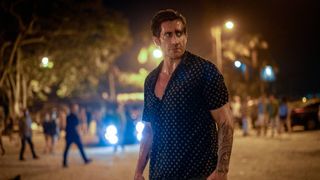
And what was it about Liman’s vision for his version that made him jump on board so quickly? ‘Doug always does action in a different way, and he came to me and said, “I want to do fights in a way that has never been done before.” He became pretty much obsessed with how the punches would land, and the kicks would land. He didn’t want them to be performed in the way that we have for audiences in the past with that kind of fighting.’ More on those scraps later.
Liman is not available for interview - more on that later too - but another thing that stands out with this take on the material (based on a screenplay by Anthony Bagarozzi and Charles Mondry) is that unlike many nostalgia-fuelled remakes, Road House takes the basic format of the original, but keeps the references and callbacks to a minimum. ‘It’s a reimagining, right?’ muses Gyllenhaal. ‘Doug and I talked a lot about the old westerns, and using that structure, and it’s referenced in the movie. We have mad respect for the original. And then we tried to create our own world.’
Sign up for the Total Film Newsletter
Bringing all the latest movie news, features, and reviews to your inbox
In this new version, Gyllenhaal’s Elwood Dalton - primarily known by his surname, like John(?!) Dalton was in 1989 - is a disgraced UFC fighter with a troubled backstory. At a low ebb, he’s offered work as a bouncer in a Florida Keys roadhouse (called The Road House) by its proprietor, Frankie (Jessica Williams). ‘It really means a lot to her to protect the roadhouse,’ says Williams (Shrinking, Booksmart). ‘She has a legacy to maintain. I also think she’s got a sense of humour. But also she’s got a few secrets. So she really holds things close to her chest.’
Euphoria’s Lukas Gage is one of the out-of-hisdepth bouncers reinvigorated by Dalton’s arrival. While he didn’t grow up familiar with the ’89 film (‘My brothers made fun of me that I didn’t know the original’), he does have some experience of this world. ‘I bartended and worked in restaurants up until my early 20s, so I feel like I had my fair share of belligerently drunk people trying to fight you at work,’ he laughs. ‘That was pretty easy to tap into. I’ve worked at some pretty sketchy places.’
Another familiar character type is the doctor that Dalton becomes romantically involved with. Here, that character is Ellie (The Suicide Squad’s Daniela Melchior). ‘Ellie doesn’t serve the same [function] that Elizabeth [Kelly Lynch] served in the movie in the original,’ Melchior tells TF. ‘I’m not going to say that it’s better or more interesting. It’s a different take, because, also, it happens now, or at least later than the period that the original happens. So, of course, women have a different attitude with our flirtations and everything.’
Frankie’s Road House has bags of potential given the location (the film was actually shot in the Dominican Republic), but sleazy local businessman Ben Brandt (Billy Magnussen) has designs on it for his own reasons. He’s the equivalent of Ben Gazzara’s character from the original, but ‘something totally new’ according to Magnussen, who sums up his character simply. ‘Ben Brandt is the bad guy,’ he says. ‘My job is to make the hero look good.’ And he’ll stop at nothing to force Frankie to sell. When Brandt realises Dalton is not going to be moved on so easily, some muscle is called in, which is where MMA superstar and former UFC champ Conor McGregor enters the ring.
Opportunity Knox
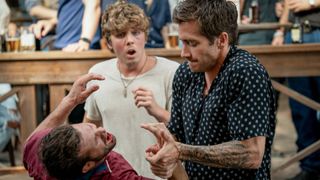
One of the biggest draws of the 2024 Road House is the acting debut of McGregor, who’s playing new character Knox. Brought in to clean house and take out Dalton, he’s a powder keg of chaos set to tear straight through his adversaries (and the movie), McGregor’s very real fighting skills adding a sense of danger to the film.
When TF catches up with McGregor, the 35-year-old Irishman is as much of a force of nature as you’d expect, had you previously witnessed any of his fights or trash talk. He Zooms with TF from his phone in bed, where he’s just awoken from a post-workout nap (he’s currently training for a comeback fight). This is his first interview for the film and, unlike the more polished, media-trained actors TF usually speaks to, he’s a bundle of unfiltered energy, talking a mile a minute, and excitedly bringing his phone right into his face.
‘I was just in awe of it all, to be honest with you, the whole process,’ he says of making his film debut. ‘I didn’t know how I was going to take to it. I didn’t know whether I was going to like it, to be honest. I’m a fighting man – that’s my bread and butter. It’s where I come from… I’m not an actor, but I’m showbusiness. That was my vibe to it. I felt that. I enjoyed every second of it.’
Road House isn’t the first film McGregor has been offered. ‘I had turned down a good few roles in my time on the climb,’ he says. ‘I’ve had directors show up at fight camp, really beautiful directors doing really top-end movies… And over and over, they’d come to me, and I always turned them down… I’d leave people a little high and dry. I probably have a few enemies out there that I don’t really know of because I had said, “I might do it.”’ It’s not until some way into the film that Knox shows up but, making one of the cheekiest entrances of the year, he quickly makes his presence felt.
‘I was told that Knox could be a gleeful terror,’ he explains. ‘A lot of people, when they see it, say I’m not even acting. It must have been like, “Hey, Conor, this is it. Action.” And I rocked in. But I gave it my best. I had a job to do – a job that I loved to do. So there’s elements that I could relate to, myself. I love the fight game. There is disruption. You can cause a bit of chaos in the business that I am in. So I had fun with it.’ It wasn’t lost on anyone that the stakes are different when there’s an actual certified fighter squaring up for the on-screen bouts. But both McGregor and Gyllenhaal had much to learn from each other.
Gyllenhaal recalls: ‘He said from the very beginning, which I was moved by, “I’m a white belt in this, and I’m here to learn. So I want to learn about making movies.” I said, “Well, I may be lower than a white belt. I’m here to learn as well.” We started from that place.’ ‘I was scared shitless,’ says Lukas Gage of his first on-screen fight with McGregor. ‘I was like, “Please, Conor McGregor, don’t accidentally hit me. Please, whatever you do, do not accidentally hit me in the face.” I was definitely scared. He was like, “What? Don’t be scared. I’ve got you.” I’m like, “Wait, Conor McGregor could probably kill somebody with his fists, but is the nicest, gentlest soul in the world.”’
McGregor tells TF that he hit it off with Gyllenhaal immediately. ‘Thank God we did,’ he says. ‘He’s so experienced in the movie game and in acting. I’m so experienced in fighting. We just blended together. We knew our strengths, and we knew we needed each other for it.’ Gyllenhaal adds: ‘There were a couple of times – actually, almost every time – I had to turn to him, and I’d be like, “Remember, you don’t actually hit me.” He was like, “OK, let’s go!” But then there were times we were grappling, and he’s talking to me while we were grappling. He’s like, “Right arm under. Wrap your leg around me. Now pull me up, through the legs.” So there was a real exchange. ‘He came up to me, and he was like, “I did that last take. What did you think of that? Was it a bit too big?” I’d be like, “Well, you have that. Try this.” There was a real back-and-forth between us, and a deep respect for both of our primary occupations.’
Punching up
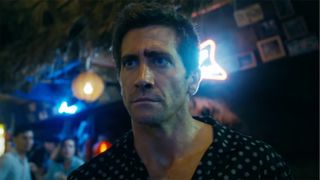
As you’ll have glimpsed in the trailer, the way Road House’s fight scenes are assembled feels totally new. Garrett Warren and Steve Brown are the stunt coordinator and fight coordinator, respectively, on Road House, although the pair admit that when they work together, their titles are pretty much irrelevant.
‘One of the things that you have to worry about in the movie industry is when a director comes to you and says, “I want to do something that’s never been done before,”’ says Warren, whose previous credits include Avatar and Ready Player One. ‘Because, let’s be honest, it’s all been done before, you know? But on this one, it’s right. When [Liman] says, “I want to shoot a fight like you see on YouTube, or like you see on UFC” – that’s when you say, “Alright, how am I going to do this magic trick?”’
Warren ended up going back to a technique he initially conjured up for Avatar, that didn’t end up being needed due to that film’s digital world: a ‘Garrett shot’, also known as a ‘multiple pass’ or ‘alphabet shot’. It comprises several stages. First, you shoot a fight in the traditional Hollywood way, with punches thrown and reactions acted. ‘The next thing you do is, you remove one person from the equation, and you put a pad there,’ explains Warren. ‘You say to that [remaining] person, “Hit this pad as hard as you can.” And that person lays into it, and hits it with all their might – and it looks awesome. ‘And then you remove that person, and you swap. You say to the person [about to be hit], “Do not react. Do not try to sell this punch. Just be ready for the character that you are.” ‘I take this pad – it’s a very soft, square pad – and you jam it at them. You hit them for real. Anybody – a girl, a guy, a child. It doesn’t matter because it’s basically a glorified pillow fight.’
It means that the body on the receiving end will react physically, as if to a real blow. ‘It’ll look like a UFC fighter getting hit in the face, and trying to keep their composure,’ adds Warren. ‘It’s wild.’ To finish, they would film a ‘slow-motion’ pass with the stars play-acting the fight at reduced speed (‘Like when you were a kid,’ Gyllenhaal grins), followed by a clean pass with no one in the shot. Then all the different layers are stitched together. Warren pulls out the unassuming red rectangular pad that’s been used to pummel actors’ faces. He also gets up a video to show TF the test he put together (where he was on the receiving end of the blows) as a proof of concept. ‘I thought, “OK, we’ll do this magic trick once or twice, maybe three times,”’ says Warren. ‘But no, not with Doug. Doug wanted to do it the whole time. The shots were never cut. When you see this movie, the fights are way beyond any fight that has ever been filmed in cinema history. This is something that is groundbreaking.’
The pad went through a lot of fine-tuning, with an R&D period where Warren and Brown were repeatedly hitting each other in the face. ‘We had to figure out which one would displace the body, but not overwhelm the brain and the face too much,’ explains Brown. Warren and Brown both have extensive fight experience in their own backgrounds, bringing another dimension to the on-screen fights. ‘There’s a lot of psychological warfare that goes into a real fight,’ explains Brown. ‘I think this is one of the things that truly makes this movie special.
Jake was all-in on every facet. He was so intrigued with fight psychology. When we would train fight choreography, we would talk to him about what he’s achieving. Someone’s trying to impose their will on you in a fight and you can’t let them, or you have to take it away from them.’
Adding to the action quotient of this take on Road House is the UFC element of Dalton’s past. This includes flashbacks to a career sequence that were filmed at a real UFC event. ‘ I was on a high for four days after,’ Gyllenhaal says of filming in front of a real Vegas audience (which had to be postponed by a few months after he caught COVID just before the first attempt). ‘It was so exciting.’ Footage of Gyllenhaal filming his weigh-ins and fight highlights went viral at the time, and the team had only minutes at a time to shoot between the real pay-perview fights taking place. ‘And they keep coming up to us, and now they’d be like, “You have two more minutes,” ’ explains Gyllenhaal. ‘And we’re like, “OK, we can still get this!” And we were actually doing a fight – a fake fight, but our fake fight – in front of UFC fans. Man, they were so great.’
It was another way in which McGregor’s career experience proved invaluable. During that Vegas shoot, McGregor was on his home turf, but he wasn’t there to fight. ‘I went on before the weigh-ins, just right before Jake comes on, and got the crowd going,’ McGregor beams. ‘I told them all, “Guys, you’re going to be in the greatest movie. It’s my first movie. We’re going to blow the roof off this. Give it up for Jake Gyllenhaal!” And then I went into the crowd, and I was hyping up the crowd. So we got the absolute full effect of it.
No holds barred

There has been another significant bust-up that has occurred outside of the making of the film. Shortly before the film’s first trailer dropped, Doug Liman announced that he would be boycotting the film’s South by Southwest premiere. His pride in the film shines through, but the extended statement excoriates Amazon MGM Studios for not releasing the film in cinemas (it will premiere on streaming service Prime Video). ‘If we don’t put tentpole movies in movie theatres, there won’t be movie theatres in the future,’ he writes, in a column for Deadline.
Gyllenhaal is diplomatic when TF asks about his reaction to Liman’s statement. ‘I adore Doug’s tenacity, and I think he is advocating for filmmakers, and film in the cinema, and theatrical releases. But, I mean, Amazon was always clear that it was streaming. I just want as many people to see it as possible. And I think we’re living in a world that’s changing in how we see and watch movies, and how they’re made. What’s clear to me, and what I loved so much, was [Liman’s] deep love for this movie, and his pride at how much he cares for it, how good he feels it is, and how much people should see it.’
Gyllenhaal professes to being a lover of the cinema experience, but adds: ‘I’ve also sat watching a film on my computer, or in different places, and been so profoundly moved. If the job of a story is to move people, I have been moved in both forms. I’m a deep lover of cinema and the theatrical release – but I also do really embrace the streaming world.’ McGregor is typically forthright when he gets on to the subject. ‘I’d love for it to be in theatres, he says. ‘I’m for the theatre. I understand the business, also… I’d love a call with Bezos.’
‘As an actor, so much of the end product is out of your hands,’ considers Williams. ‘So you have to learn early on to not have an attachment to the outcome. It passes through so many hands. I think growth, for me, as an actor is – every time I step on the screen – giving it 100%, and then letting it go.’
Liman’s decision doesn’t seem to have soured any of his cast on the experience. ‘Doug is one for risk and adventure in his real life,’ says Gyllenhaal on fulfilling the 20-year journey to their collaboration. ‘And so there was this sense of wonderful risk when you’re working with him… I just adore Doug. It was great fun.’ Clearly proud of this experience, Gyllenhaal is open to revisiting the character in the future. ‘I love Dalton,’ he says. ‘I love what we’ve created in the character, and the whole team that made him. I’d be remiss in saying that Dalton is just me. There’s five incredible stunt guys, also, that created him too – like on any of these movies. I would love to work with them, and I would love to be back in the sort of attitude that is Dalton.’
It’s less clear what McGregor’s on-screen future holds, especially as he gears up for his MMA comeback. ‘I don’t know,’ he responds when TF asks if there’s more acting ahead for him. ‘I’m happy I’ve got one [film] done. I’ve got one great one, and it’s an all-timer. I learned good lessons on the craft.’ Though he does tease, ‘Knox doesn’t go down without a fight.’ For all the challenges in the making of Road House, don’t bet against another round.
This article first featured in Total Film magazine. Buy the issue here.
Road House is on Prime Video now. For more on the film, check out our interview with the cast about working with McGregor.

I'm the Editor at Total Film magazine, overseeing the running of the mag, and generally obsessing over all things Nolan, Kubrick and Pixar. Over the past decade I've worked in various roles for TF online and in print, including at 12DOVE, and you can often hear me nattering on the Inside Total Film podcast. Bucket-list-ticking career highlights have included reporting from the set of Tenet and Avengers: Infinity War, as well as covering Comic-Con, TIFF and the Sundance Film Festival.
Most Popular




